New Order v. Shakespeare In The Park
by Carmen Johns
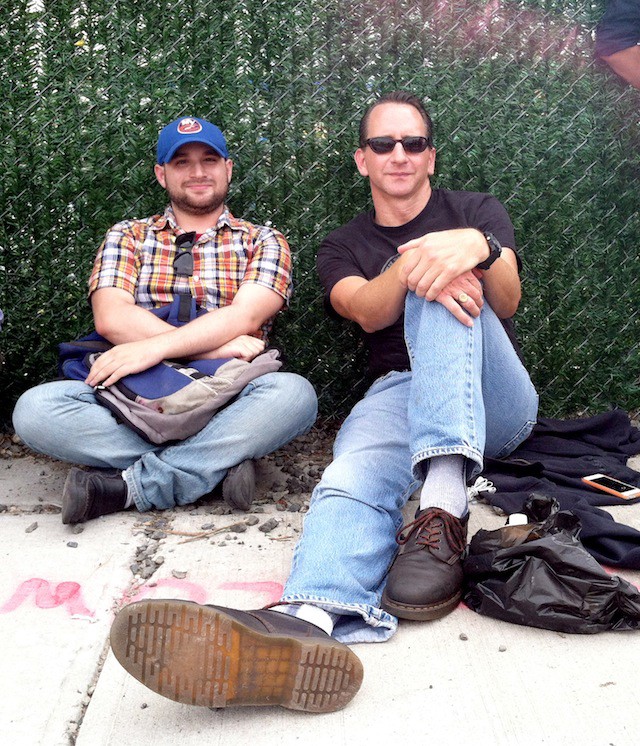
“First In Line” goes deep with people who are first in line. In this issue: Shakespeare in the Park and New Order in Williamsburg Park.
Aaron and Chris, New Order
The Awl: Tell me about your relationship with New Order’s music. How far back does it go? Do you listen to them every day, still?
Aaron: I got into them my junior year of high school, and I remember at the time I was just going through like, typical high school drama and I’d have like, a new girlfriend every month or so, and I remember their first album I bought was “Power, Corruption and Lies,” and it was the last day of like, one of my relationships. She broke up with me like later that evening, and I listened to that album the next day and as soon as “Age of Consent” came on like, a ton of stuff just started to make sense about my life and where it was heading and after that I had sort of gotten everything straightened out. I stopped getting into relationships because I felt the need to. And I think they just play like a huge part like many other people of like, your, you know adolescent/post-adolescent years and even beyond that, you know. So they’re a pretty huge part of my life.
Chris: I think like many New Order fans the first song I heard was “Love Will Tear Us Apart,” and that was the late 80s and I was blown away by them. So the first album I got was “Substance,” their compilation album, and then a few years later “Bizarre Love Triangle” came out and, you know blasted the doors off me, so I’m one of those few people that bought those Substance albums, uh, no idea the bands were interrelated until suddenly I started realizing they’re called the same name, and then became a huge fan and saw them I think about a decade ago in Oakland and did this, queued up in the line, up against the stage sitting right across from Peter Hook and they opened up with Joy Division, “She’s Lost Control.”
The Awl: So liking New Order today means that you’re associated with a certain culture, I think a hip sort of culture, you could say. What did it used to mean? Is it similar? How did it change?
Aaron: I don’t really associate New Order with any sort of culture, really. I think they’re so widespread, so many people like their songs and they have so many different facets of their music that can appeal to so many people, you know, looking for something like if you wanna dance you can dance, they also have like a darker more post-punk kind of stuff that people liked about Joy Division on their earlier records. So I think, you know, they have a pretty wide appeal and I don’t think like, you know, they’re so, such a, narrow fan base as people would think.
Chris: So I had a different experience, I’m older, I’m closer in age to Bernard Sumner than anyone in line. So I had a great corporate job in the early 90s in a corner office where I managed a lot of people, and when you walked into my office the only thing on the wall was a four-foot wide picture of those tombstones: “Joy Division, Love Will Tear Us Apart,” and people would walk in, you know, corporate business guys, and just go, “What is this? What’s going on?” It’s gothic and funereal — you know we sell phone systems for a living — and I was the number one office out of you know, 12 or 13 in the state of California, so they said, “Yeah, as long as it works.” So I think, I think I related to Joy Division cause it was, it couldn’t be classified and if you understood the, you know, the story of Ian Curtis and were sympathetic to it, there was a sense of memorial to his art and what he had done, and then New Order, as it gave new life to the band members, you know, gave new life to all of Joy Division fans so you had this mournful period of reflection on Ian and that beautiful music, and then bam, they turned it up with a new sound that I think captivated the world in terms of their bigger hits. So, I think they defy classification today and I think everyone is not sitting in line on earth right now to see New Order is out of their mind. It’s where you should be!
The Awl: So I was here a couple of days ago to do First In Line for Odd Future, and the line was about 10 people wide and around the entire block. Could you comment on the difference between this line and that line?
Aaron: I mean, I don’t, I wasn’t here for that line. This line is pretty impressive so far, considering how many obligations people probably have to blow off to come here today, to come here so early to see New Order, so it’s really nice to see like, you know all these people in line and all this camaraderie between everyone.
Chris: So I saw them in Ibiza, Spain, they were sold out. I saw them at the Hollywood Bowl this last year, they were sold out. I saw them in Oakland, they were sold out. So, I think part of it’s the venue, the timing, so I can’t really say in terms of what the capacity will be tonight, but die hard fans show up in force. I will tell you that, I told my friends who were in line that when I took my daughter to see them it was because of a promise made when she was very ill, I told her “If New Order every tours again, I’ll fly you anywhere on earth to see them,” knowing that New Order would never tour again. So, a year later she sent me a link to their tour dates and said, “Pick your favorite European country.” So we flew to Ibiza, Spain, and when I found out, when we got there and I found out where the band was staying I left them a note, left the band a note, and they called me on my cell phone and said “We wanna meet your daughter and you, you flew 10,000 miles to see us,” and she burst out crying when she saw them. They were so sweet and nice and it’s the best event she ever had in her life. So they’re great people and it’s why they produce beautiful music. And they’re all family-oriented and they really responded to, you know, a father and daughter team traveling the world to see them.
The Awl: Tell me about yourselves. What do you do?
Aaron: I’m a student right now currently. I’m studying social work over at New York University grad school. I go to concerts pretty often, I’d say probably like three or four times a week. Yeah, so, it’s part of my life.
The Awl: Who have you seen lately?
Aaron: I saw The National last month at Barclays Center, that was an incredible show. Um, I saw Belle and Sebastian and Yo La Tengo about two weeks ago at Prospect Park, also incredible.
Chris: I’m a telecom executive in Silicon Valley. I’m 51, two kids, divorced and New Order is the only band that I would do this, take a red-eye from California, play hooky, pretend I’m still working, sit here with people my kids’ age and uh, you know, look forward to just a terrific event tonight. So, um you know I’ll go to concerts a fair amount. I just saw Yes. None of you — do any of you know Yes?
Aaron: I love Yes.
Chris: I saw them at an unbelievable venue about two weeks ago, so for particular bands I’ll come out of hiding and go um, I love live music of any type you know, in a club or whatever.
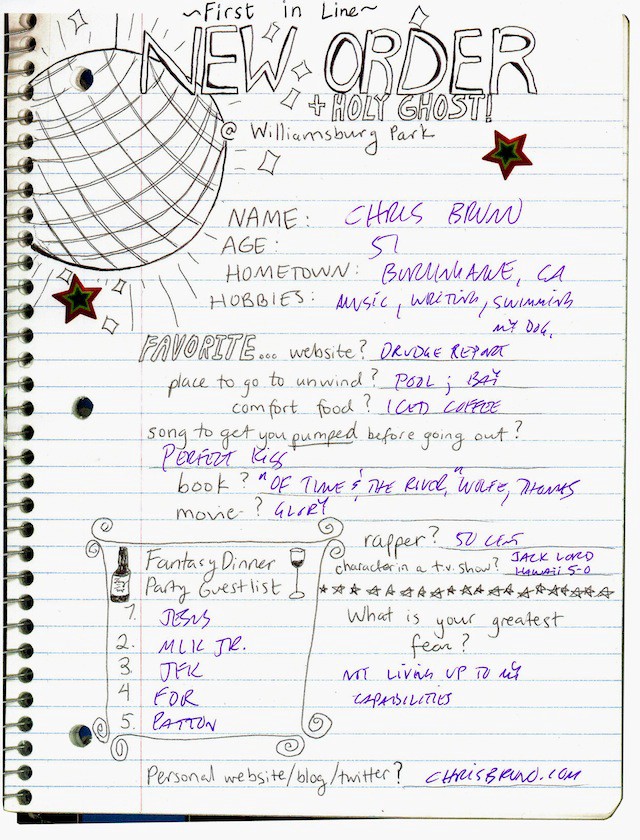
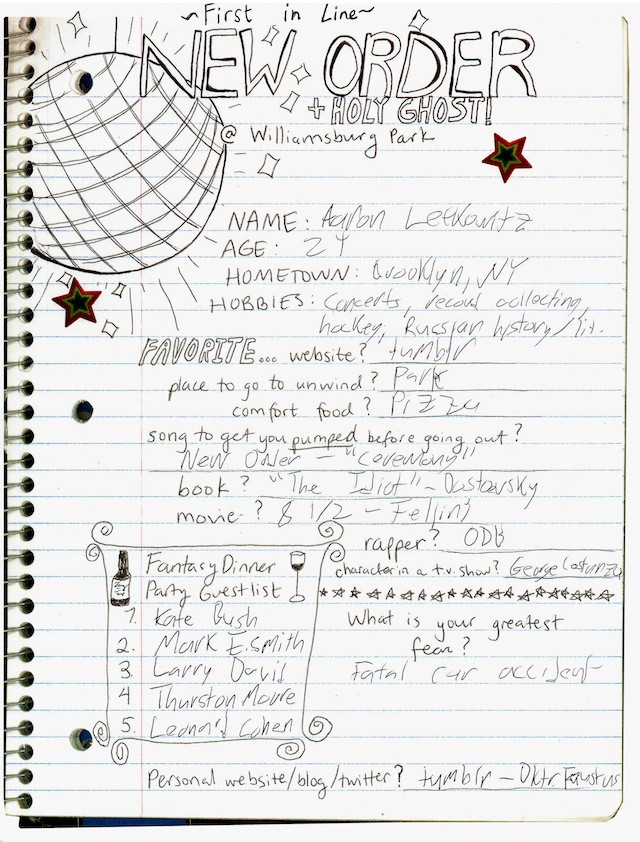
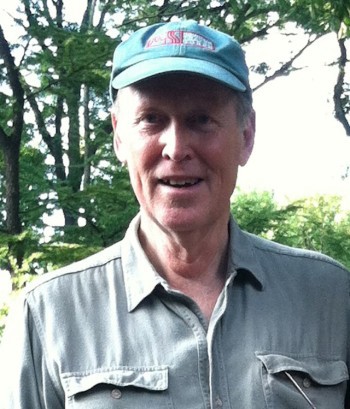
Tom: Shakespeare In The Park
The Awl: Tell me about your relationship with Shakespeare and literature and theater — are you here to see specifically the play for the musical component or because you’re very interested in Shakespeare?
Tom: Shakespeare in the Park is a tradition for us. We’ve been doing SITP for 30 years, so we look forward to every summer, plan to see as much as we can
The Awl: Are you always first in line?
Tom: No! No, actually we were planning to come a couple of days later. I came up this afternoon to actually find out what the rules were this summer because they change from year to year. And um, I was told that the tickets were given out but that there was a line for stand-by. So, I was already here, so I jumped on and made a line.
The Awl: What time did you get here today?
Tom: 3:15 p.m.
The Awl: Tell me about why you’ve made this such a big tradition in your life.
Tom: Mmm. It basically exemplifies a lot about what I like about New York and what makes New York special. It’s Shakespeare. It’s Joseph Papp, it’s the Public Theater, which has been an institution for 40 years or so in the city. So, the Public is close to where our apartment is in town, and that’s an institution that I think a lot of and would like to support, and this is an amazing outgrowth of that. So for me, a quintessential summer day in the city — and we’re not here all the time, we have an apartment in the city, we don’t live here all the time — a quintessential summer day is to come get in line, read a book, talk to the people in line, get tickets and then come to Shakespeare in the evening. That’s it. I mean, that’s a lot of what New York says to me.
The Awl: What have you been reading these days?
Tom: Actually, I, I was not planning to be in line today so I’m stuck with the crossword puzzle from last Sunday. Otherwise I would be reading David Foster Wallace, Pale King, is what I was reading just today earlier.
The Awl: Do you make sure wherever you are to see a lot of theater or is it specifically something you do when you’re in New York?
Tom: You know, there’s theater everywhere now, and I appreciate that, but when people ask me, did I see a show in Ogunquit in the summer I sort of usually say “No, I saw that in New York” or “I’ll see that in New York.” So, if there’s specific things to go for like for example, if there’s the Ring Opera in Seattle, I may go for that because that’s a special experience. But seeing theater, I tend to sort of be New York-centric about that.
The Awl: Tell me about the first time you ever saw Shakespeare in the Park.
Tom: Wow. I don’t remember the first time, I remember a very memorable “Midsummer Night’s Dream” with I think Kevin Spacey maybe? And Meryl Streep. And um, just any number of wonderful memories of being in the park and seeing Shakespeare.
The Awl: Do you have a favorite memory?
Tom: Umm, that’s hard to say. I don’t know…I don’t know that I do. [His wife: Not “Uncle Vanya”?]
Tom: Mmm well, we’re talking Shakespeare. It would be hard to select a single one
The Awl: What about “Uncle Vanya”? Did you see that here?
Tom: Yeah, yeah… and it’s interesting that we’re doing things besides Shakespeare now. But I like the backbone of Shakespeare, and actually I’ll be very interested to see what we do with, sort of Shakespeare updated, which is what I’m expecting to see now.
The Awl: Are you ambivalent about the fact that it’s been made into a musical?
Tom: Oh no. No, I think that’s wonderful. It has to be re-interpreted all the time. I think it shouldn’t be re-interpreted out of any context at all, but re-interpretation is fine.
The Awl: Tell me about yourself: what are your hobbies? What’s a day in the life of Tom?
Tom: Well, my wife and I are both retired physicians, and our main home is in New Hampshire, but we have an apartment in New York. And so we spend time in New Hampshire, and then we come to New York, and they’re two very different experiences but both very different important parts of our lives.
The Awl: What is your favorite play by Shakespeare or otherwise?
T: It would have to be “Macbeth,” for a lot of reasons. I actually played in a Macbeth in high school, when that was a sort of um… it was important for me at the time because it allowed me to become a persona in high school that I was not here before. And so that opened a lot of different avenues for me. And in fact I was just remembering that last year because we were having our 50th high school reunion and was asked if we could do a little scene from all those years ago and I said you know, the last thing you wanna do at a reunion is to be doing “Out, out damn spot” or “Life’s but a moving shadow,” so we did a sort of send-up of “Macbeth” with songs based on “South Pacific, “which was another musical that we did. So, that was good. But, that made it a memorable play.
The Awl: I wanna hear, if you would care to talk more about the avenues that opened up when you acted in Macbeth. What happened?
Tom: I transferred to this high school in my sophomore year, and a lot of the people at this school had been in this school since grammar school. It was a kindergarten-12 sort of school. And I was the smart kid and I could do grades, but I wasn’t in sports, and so one way to make me something other than just a studious nerd was, uh… plays. Um, forensics, you know? And specifically doing, doing plays, and so that was sort of — it allowed me to become a different person. And a different person to the people that I was, you know my classmates. And so, from there, I actually went on to sort of branch out in life, to do things more than just studying. I mean, studying was important, obviously studying is important to get to be a doc, but it’s important to have a life outside that. And one of the beauty parts of what we’re doing now is that now my wife and I are enabled to live a life, taking advantage of some of those things that you have to be more careful about when you’re busy with a practice. And this is one of those things.
The Awl: To be careful about?
Tom: No! To live! To do New York! To do plays!
The Awl: Tell me about a fear that you have. A great fear.
Tom: Fears that I have? Oh, you mean in a generic global sense? A concern would be I guess if this city, this great city can continue to maintain this sort of degree of cosmopolitanism and also um… I feel like the city has achieved a level of livability recently, perhaps under a recent administration and the past couple administrations. Ah, let’s see maybe we were in the 70’s, and the 70’s- you’re too young to remember this- but they were talking about New York going bankrupt and it was a fair amount of crime and a fair amount of concern about where you could go and where you couldn’t go, and I don’t sense that at all now. I sense that things are very livable in the city, and I’d like to see it continue because the city has so much to offer.
The Awl: If today was the last day on earth, what would you do?
Tom: I have a great one for that. There’s a story from high school Latin. There was a great Roman general, I think Cincinnatus was his name, who was being recalled to Rome to answer for some charge that had been whipped up by people who didn’t like him at the senate. And he knew that when he went back there would be enough people in the senate that would be against him that it would probably cost him his life. And he was called back while he was out in the field plowing, and that messenger said, “So, Cincinnatus you’re going back to the Senate to answer for these crimes that have been put up against your name. I’d always been an admirer of yours and I just would like to know what you’re planning to do for the rest of the day before you have to come down tomorrow.” And he said, “I think I’ll finish plowing this field.”
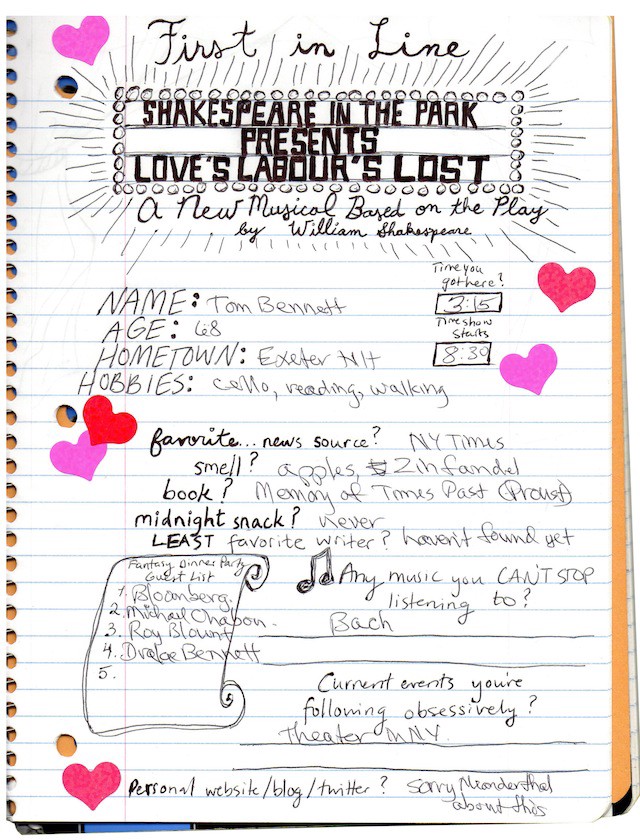
Carmen Johns is an Awl summer reporter.
